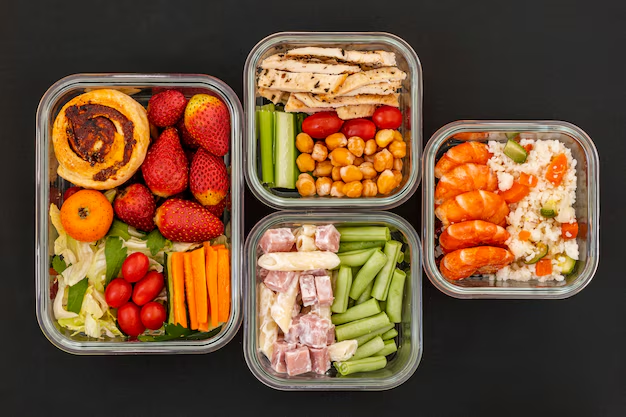The Ultimate Guide to Keeping Your Fruits Fresh in the Refrigerator
Are you tired of reaching into your fridge only to find your fruits spoiled or less flavorful than expected? You're not alone. Whether you're an avid fruit lover or someone just looking to minimize food waste, learning how to properly store fruits in the refrigerator can transform both your kitchen experience and your grocery bill.
In this guide, we'll explore effective ways to prolong the freshness of your favorite fruits, explain the science behind fruit ripening, and dive into practical storage techniques. Let's unlock the secrets to keeping fruits fresher, longer 🥝🍇🍊.
Understanding Fruit Ripening and Spoilage
The Science Behind Ripening
Fruit ripening is a fascinating process that transforms starches into sugars, making the fruit sweeter and more palatable. Different fruits have unique ripening processes, influenced by factors such as ethylene gas, a natural plant hormone. Ethylene promotes changes like softening and color shifting. For instance, bananas and apples produce more ethylene, leading to quicker ripening.
Key takeaway: Understanding ripening can help tailor your storage practices. For example, keeping high ethylene-producing fruits like apples away from others can slow down undesired ripening.
Common Spoilage Signs
Fruit spoilage often manifests in mold growth, off odors, and a change in texture. These are primarily caused by improper storage conditions or prolonged exposure to ethylene gas. Recognizing these signs early helps manage your storage strategy effectively.
Storage Strategies for Maximum Freshness
General Tips
- Temperature Matters: Most fruits thrive at temperatures between 32-40°F. Keeping your fridge at this range slows down microbial activity, extending your fruits' shelf life.
- Humidity Levels: Utilize your fridge's crisper drawers wisely. Fruits generally prefer higher humidity settings, which prevent them from drying out. Adjust the humidity levels depending on the specific fruits in storage.
Fruit-Specific Storage Solutions
Apples
- Tip: Store apples in a crisper drawer away from other fruits to keep ethylene levels in check.
- Bonus: Wrapping apples individually in newspaper can further curb ethylene exposure.
Berries (Strawberries, Blueberries, Raspberries)
- Tip: Remove any spoiled berries immediately and store the rest in a breathable container lined with paper towels.
- Extra: Wash berries before consumption rather than immediately post-purchase to avoid moisture-induced spoilage.
Tropical Fruits (Pineapples, Mangoes)
- Tip: Allow room-temperature ripening before refrigerating. Once ripe, transfer to the fridge and consume within a week.
Grapes
- Tip: Keep grapes on their vine in a ventilated bag to maintain freshness.
- Extra: For an extra boost, store them without washing to prevent extra moisture from fostering mold.
Citrus Fruits (Oranges, Lemons)
- Tip: Store in a crisper drawer. Separating them in mesh bags helps prevent bruising and spoilage.
Utilizing Storage Aids
Ethylene Absorbers
Available as sachets or cartridges, these products absorb ethylene gas, extending the life of sensitive produce.
Reusable Produce Bags
These bags maintain optimal humidity levels and can be a sustainable alternative in the kitchen.
Practical Tips for Minimizing Waste
Smart Shopping
- Buy in Season: Fruits in season tend to be fresher, more nutritious, and cheaper.
- Buy in Bulk Only Wisely: Evaluate your consumption patterns before purchasing large quantities to prevent waste.
Use Leftover Fruits Creatively
- Smoothies and Juices: Overripe fruits shine in smoothies and homemade juices.
- Freezing: Cut fruits can be frozen and added to smoothies, baked goods, or sauces.
Summary: Quick Tips for Freshness
Here’s a quick visual checklist to help keep your fruits fresh 🍌🍒🥝:
- 🧊 Maintain fridge temperature (32-40°F)
- 👍 Use higher humidity settings in crisper drawers
- 🍏 Separate ethylene-producing fruits (apples, bananas) from others
- 🧺 Store in breathable containers or bags
- 🫙 Consider use of ethylene absorbers or produce bags
By implementing these strategies, you can enjoy your favorite fruits at peak freshness all week long, reducing waste and saving money. As you become more familiar with these techniques, you'll find that preserving fruit freshness is less mysterious and more about practical habits.
Take control of your food storage, enjoy high-quality fruits daily, and make the most out of each grocery trip. Small changes can have a significant impact—each step towards efficient storage methods empowers you to savor every juicy bite 🍎🍓🥥.

